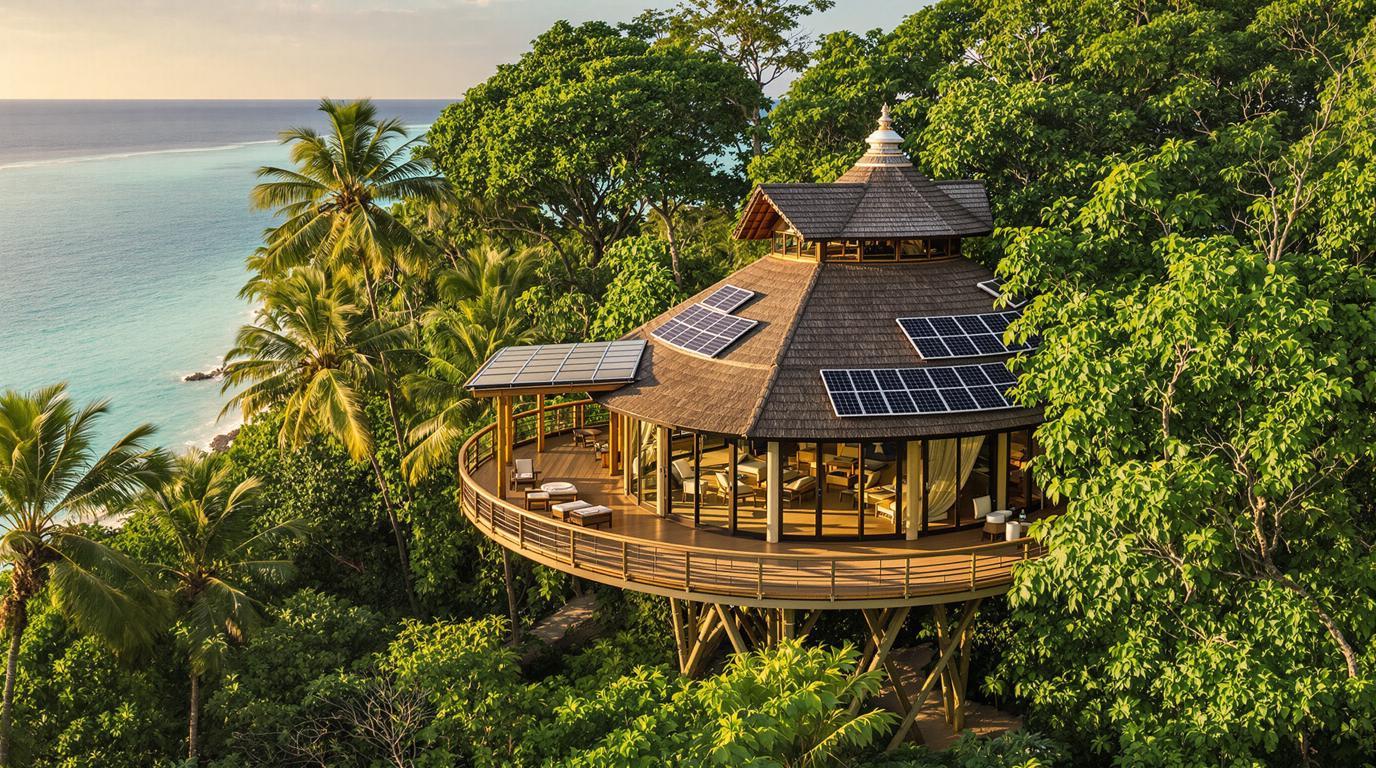# Eco-Paradise Destinations: Where Nature and Luxury Meet Sustainably
In an era where travelers increasingly seek both indulgence and environmental responsibility, a new breed of destinations is emerging. Welcome to the world of eco-paradise getaways—places where five-star luxury harmoniously blends with deep ecological commitment. From solar-powered overwater villas to carbon-neutral private islands, these havens are redefining what it means to travel well in 2025.
Costa Rica: The pioneer of eco-luxury
Costa Rica has long been the gold standard for sustainable tourism, with nearly 30% of its land under protection. The country’s eco-lodges seamlessly integrate luxury amenities with conservation. Imagine waking up in a treehouse villa, surrounded by chattering monkeys and tropical birds, while enjoying all the comforts of a luxury resort—powered entirely by renewable energy.
“What makes Costa Rica special is our commitment to conservation that doesn’t sacrifice comfort. Guests can enjoy world-class amenities while knowing their stay actively contributes to protecting our biodiversity,” explains Manuel Torres, manager of a renowned eco-lodge in Monteverde.
The Maldives reimagined: Kudadoo Private Island
The Maldives has transformed from a destination known primarily for luxury into a laboratory for sustainable paradise. Kudadoo Private Island stands out with its fully solar-powered operation, providing carbon-neutral luxury that includes private butlers and gourmet dining. The resort’s design incorporates locally-sourced materials and works actively on coral reef restoration programs.
Sweden’s Arctic Bath Hotel: Floating in sustainable splendor
For those seeking a completely different eco-luxury experience, Sweden’s Arctic Bath Hotel offers a floating retreat that allows guests to witness the Northern Lights while treading lightly on the environment. This architectural marvel uses sustainable building materials and operates with minimal environmental impact, proving that even in extreme environments, luxury and sustainability can coexist.
Indonesia’s Bawah Reserve: A plastic-free paradise
Nestled in Indonesia’s remote Anambas Archipelago, Bawah Reserve has eliminated single-use plastics and operates entirely on solar energy. The resort’s 35 bamboo suites offer panoramic ocean views while maintaining a minimal ecological footprint. Guests can participate in conservation initiatives like reef monitoring and beach clean-ups between luxurious spa treatments.
Wildlife watching with purpose
Eco-luxury isn’t limited to beach destinations. India’s sustainable wildlife lodges offer intimate encounters with tigers and other magnificent creatures while supporting conservation. Similarly, Botswana’s solar-powered safari camps provide front-row seats to elephant herds and predators while funding anti-poaching initiatives.
“The best wildlife experiences happen when tourism, conservation, and community development work together,” notes wildlife biologist Dr. Sarah Johnson. “Today’s eco-luxury safaris are proving that high-end experiences can directly fund protection of endangered species.”
Farm-to-table redefined
A hallmark of eco-paradise destinations is their approach to dining. Many resorts now feature on-site organic gardens, dramatically reducing food miles while enhancing freshness. At Six Senses Zil Pasyon in the Seychelles, guests can harvest ingredients for their meals alongside chefs, creating a deeper connection to the food and landscape.
Transportation evolution
Getting to paradise sustainably remains challenging, but scenic train journeys are making even the journey part of the experience. Once at their destination, travelers enjoy electric vehicles, bicycles, and even solar-powered boats, minimizing the carbon footprint of exploration.
Cultural immersion with integrity
True eco-luxury extends to cultural sustainability. Authentic engagement with local communities has become essential, with resorts hiring locally and showcasing indigenous culture respectfully. Guests might learn traditional crafts, cooking techniques, or cultural practices directly from community members.
Budget-conscious eco-options emerging
While many eco-paradise destinations come with luxury price tags, a new wave of mid-range and budget-friendly options is emerging. Community-owned ecolodges in places like Costa Rica and Ecuador offer authentic experiences at lower price points, democratizing sustainable travel.
As travelers increasingly seek meaningful experiences that align with their values, these eco-paradise destinations represent the future of luxury travel—where indulgence comes with the satisfaction of knowing your vacation supports rather than harms the planet. The revolution in sustainable luxury isn’t just changing where we stay; it’s transforming how we experience the world’s most extraordinary places.
